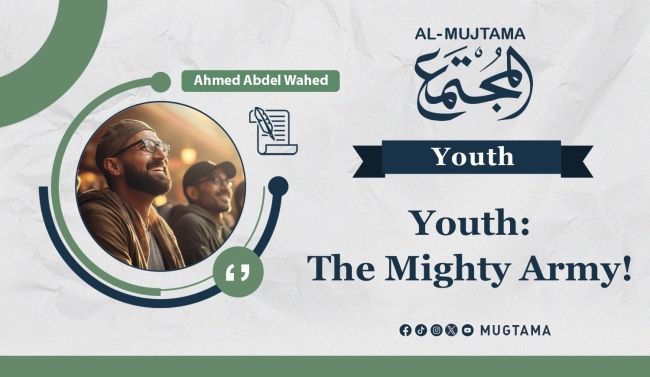The International Youth Day, celebrated annually on August 12, passed by without the fanfare or media, political, and societal attention that such an event, and this rising and capable force, deserves. This force consists of 1.2 billion youths, representing 16% of the world's population.
The Arab region holds an advantage in this regard, as it possesses a youthful energy that makes it the leading region in terms of the largest youth population, compared to Europe, which is the most aged continent, according to data from the United Nations.
Arab countries are characterized by having an average age under thirty, especially Egypt, the most populous with over 100 million people and an average age of 23.9 years, Libya with 26.3 years, and Saudi Arabia with 29.8 years. In contrast, for example, the average age in Italy is 46.3 years, in Germany 44.9 years, and in France 41.6 years.
Despite this qualitative advantage, Arab societies, besides ignoring the event, impose many pressures and challenges that hinder the political, economic, and societal empowerment of the youth. This might even push them behind the walls of frustration, oppression, unemployment, crime, and suicide, with a deliberate marginalization of this immense energy from the circles of influence and decision-making.
Where are the Arab youth in governance institutions? Where are they in parliaments and legislative councils? What is their impact in the spheres of finance and business? What is their influence on the economy and politics of their countries? Where are they in the fields of science, innovation, invention, and production? And why the insistence on keeping them in the realms of sports, entertainment, and amusement?
Many pressing questions arise, given the lack of benefit from this demographic growth in youth numbers, compared to the aging problem faced by the West, which grants Arabs a rare advantage to make a substantial change in the future if this energy is revolutionized and well-utilized in improving the quality of the state's and society's sectors, advancing them to promising horizons.
When you realize that over 92% of the Middle East's population is between 15 and 29 years old, meaning that about a quarter of the region's population (108 million) are young people, we are looking at a massive army, invaluable, made up of energy, vitality, courage, and the ability to innovate and overcome challenges if given the circumstances, with a free will and wise management towards change.
However, the stark contradiction is evident when comparing the current situation to the rising unemployment rates worldwide, which reached 13% last year, with Arab countries among those suffering the most from youth unemployment, according to data from the International Labour Organization.
From unemployment to suicide, there is one person in the world dying by suicide every 40 seconds, with more than half of the suicides being people under 45, and suicide being the second leading cause of death among young, according to the World Health Organization.
The indicators of unemployment and suicide reveal what young people suffer from globally, especially in the Arab world, amidst political exclusion, economic marginalization, societal oppression, educational deterioration, and media degradation. This casts enormous burdens on this group, which should be the lever of progress and advancement, but instead, has become captive to need, deprivation, disintegration, extremism, and illegal migration, among other challenges that prevent youth empowerment and granting them full rights in building society and leading the ship of progress and advancement.
Although some Arab countries, particularly in the Gulf, enjoy enormous financial and economic capabilities, the youth in these societies are being rapidly and systematically pushed towards football fields, entertainment arenas, music festivals, and wrestling rings, while Palestinian youth are writing a legendary epic of resistance and resilience against a brutal arsenal of killing, violence, and destruction.
It is a grave and serious mistake for International Youth Day to pass without serious reflections at all political, legislative, economic, media, religious, cultural, and intellectual levels, provided that a serious and objective evaluation of the realities on the ground, and the available capabilities and budgets for these promising generations, takes place.
We are in urgent and dire need of genuine accountability for everyone regarding what we have provided for Arab youth, so that we can excel with their vitality and energy, for once, over the West that suffers from illness and aging. The goal here is not to excel in numbers, but to achieve qualitative excellence in the fields of science, work, production, innovation, technology, and exports, among other areas of life.
We also have a noble message, which is to summon the Arab youth anew, sharpen their energies towards attempts, restore hope, self-confidence, work towards reform, constructive cooperation, exchange of experiences, and building bridges of understanding between the components of society. This includes forming support and motivation groups that adopt their causes, work towards achieving their dreams, and influence the course of events positively, constructively, advancing, not retreating.
Where are the youth? How do we awaken the energies of this massive army? When will the present and future belong to them?
Pressing questions remain in need of answers from everyone!
-------------------------------------------------------------


